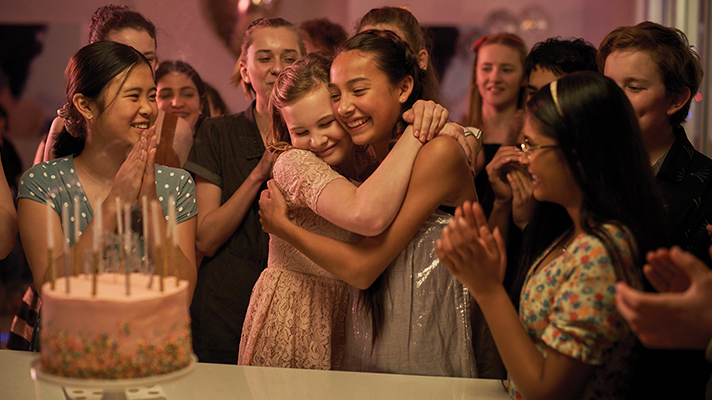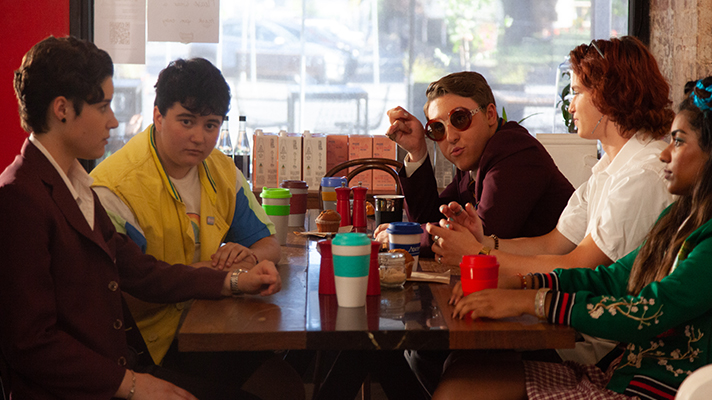Kids’ TV in the classroom: Why screen content is a powerful tool for teaching consent
Bridget Hanna
2 Jun 2025
Australian children’s television stories aren’t just entertaining: they have social, cultural and educational value for children. The programs supported by the Australian Children’s Television reflect the diverse social, emotional and cultural experiences of young people, making them powerful tools for learning in the classroom.
In today’s increasingly diverse and media-rich classrooms, finding effective and engaging ways to teach consent and respectful relationships is more important than ever. At the ACTF, we believe that screen texts are uniquely powerful tools for supporting these vital conversations in schools.
Screen stories can help educators teach respect, communication and consent in meaningful and age-appropriate ways. Here’s why screen texts are such valuable resources and how they can help children build confidence, empathy and emotional literacy.

A true reflection of their community
One of the most compelling reasons to use screen texts in the classroom is the way they reflect the lived experiences of children. Imagine watching TV as a young person and never seeing anyone who looks, sounds or lives like you. Now, imagine the opposite, seeing your world represented authentically on screen. That recognition fosters a powerful sense of confidence, belonging and possibility.
Australian content matters because it tells our stories. It gives children the opportunity to see themselves and their communities in all their diversity, building not only self-esteem, but also empathy and curiosity about others. These are the emotional foundations for teaching consent and respectful relationships. When students see characters navigating boundaries, communication and respect, they start to better understand and articulate their own feelings, expectations and values.

Screen stories as a gateway to difficult conversations
Teaching consent can be challenging. Students often feel uncertain or uncomfortable and some may be reluctant to participate in open discussions. One effective strategy is to use screen stories as a springboard. By analysing characters and narratives, students can engage with sensitive topics at a safe distance, observing behaviours, choices and consequences without the pressure of speaking about themselves directly.
To support these conversations in the classroom, ACTF Education has developed the Consent and Respectful Relationships: Curated Clip Collection. This resource features 15 clips from well-loved Australian children’s television series, for both primary and secondary year levels. Each clip is paired with scaffolded learning tasks based on a simple structure: Reflect, Explore, Create. This sequence guides students to unpack key concepts and apply them in practical and creative ways.
Empowering students with real-world skills
As children grow, their understanding of consent evolves. What begins with simple concepts like asking before using someone else’s belongings expands to include more complex ideas such as privacy, trust, digital safety, cultural sensitivity and sexual consent. This progression is reflected in the structure of the curated clip collection, offering age-appropriate learning opportunities at every stage.
In the early years of primary school, lessons focus on learning to ask permission and understanding the importance of sharing and respect. These foundational ideas are crucial as they set the stage for later discussions around more complex topics. As students move into the upper years of primary, the focus includes digital safety and consent in online spaces. In Years 7 – 8, the focus turns to relationships, identity and emotional trust. In senior secondary years (Years 9 – 12), examples address more mature and emotionally layered situations.
Through these varied and developmentally appropriate examples, students build real-world skills that support respectful relationships, both offline and online. By using screen content that reflects students’ lives, we can empower them to think critically, act compassionately and make informed decisions that respect their own boundaries and those of others.

Helping students thrive
Ultimately, screen texts do more than entertain: they help students explore complex ideas in relatable, engaging ways. When used thoughtfully, they can transform how children understand consent, respect and relationships, helping them become more empathetic, confident and aware of the people and world around them.
Whether it’s learning to share space in the playground or navigating online interactions with care, screen stories offer children the tools they need to thrive in today’s interconnected world.
Explore the full curated clip collection today: Consent and Respectful Relationships: Curated Clip Collection


Comments
Comments for this post are open.